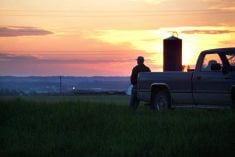“You’re supposed to stir the Crock-Pot.”
After a quick hello, these are the first words out of my mouth when I meet Sarah Leguee. I’ve just come from the field where her parents are harvesting peas, and her mom has asked me to pass the vital message along.
After all, no matter how crazy it gets, harvest meals need making. So, while the combine is calling in the background and as she gets ready to exchange one set of work clothes for another, Sarah steps back into the kitchen to grab the ladle.
Read Also

The big squeeze: How to be fair to siblings during farm succession
Managing sibling business relationships on family farms.
Sarah has come from her job in town to her parents’ farm near Fillmore, an hour southeast of Regina, to help with the harvest. But “help” is the wrong word. Sarah owns and farms a half section of land and rents another quarter.
It’s not much compared to the 9,500 acres that her parents farm. But it’s her own.
“I was lucky, I guess. Since I was 12 or 13 I knew I wanted to be a farmer,” says Sarah, now 24. “Other kids would be worrying about what they wanted to do, but I’ve always known. Within the next five to six years I want to be doing this full time.”
It’s no small goal. Though Sarah can run any piece of equipment on the farm, take care of cattle, and fix her own truck, she is only too aware of the management and financial savvy needed to run a grain farm today. “It’s hard to do because I don’t do enough of it,” she says. “And I want to make sure I’m on top of all that before I get into purchasing more land.”
Sarah laughs when I ask how it’s gone so far. “Well, I’ve been farming it for five years now and I think I’ve come out ahead most of those years,” she says, adding that the canary seed she grew this year is already in the bin.
It has been a steep learning curve, overwhelming at times, Sarah says, especially in her first couple of years. And, she admits, she hasn’t got it all figured out yet.
“But I do understand it better now and I’m getting more comfortable with it all the time.” She sits taller and grins. “It just makes a person feel a lot more involved. I’m a real farmer now with input in the operation and a stake in what happens.”
After high school, Sarah attended Olds College in Alberta, where she received diplomas in agricultural production and ag business. Though a little nervous about leaving home, she believes the experience was invaluable. Sarah met many young people with similar interests who have become friends and contacts in the industry.
Through her current off-farm job as service writer for an ag implement dealership, Sarah has picked up a lot of information about what other operations are doing in terms of management.
It’s a good thing, as she doesn’t have many young role models she can look to. “But it’s getting better,” Sarah says. “More young people are coming back, coming home to farm. Years ago everyone left, but I think they are seeing there might be a future in it after all.”
Sarah certainly has few young female peers. “Yeah,” she laughs and shakes her head. “Even my friends have their stereotypes. When I tell them I farm, they right away ask if I’m married, or if it’s my dad’s farm. They just don’t get that I own land and everything that goes with that.”
In a way, it’s no surprise Sarah has ignored the stereotypes. A long line of women have farmed the Leguee land in one way or another over the past 50 years.
“We’ve always had women on the farm — my grandmother, my aunts, my mom and now my sister and I. We’ve always done whatever needed doing whether it was field work, working with cattle, trucking, or housework.”
But the Leguee situation is a bit of an anomaly according to farm business specialist Betty Hansen. Hansen, who advises farmers through her consulting firm, Crossroads Planning Group in Mossley, Ont. and who is a member of Canadian Association of Farm Advisors, believes the general absence of young, female peers has kept women in traditional roles on the farm.
“One of the challenges with farming compared to other professions like accounting,” Hansen says, “is that young people in those other occupations will article and intern with other novices in their chosen profession. But in farming you are working with a parent as opposed to peers. The evolution of tradition takes longer in this kind of hierarchical environment.”
The presence of generations of women may be the reason Sarah’s parents, Russ and Sharon, are acutely aware of treating daughters Sarah and Amber, and son Jake equitably when they consider the future of the farm and their estate plans.
“I can look out during harvest and see one of my daughters desiccating the peas, my son swathing and my other daughter combining,” says Russ with obvious pride. “They can all do what needs to be done. You can’t get that anywhere else.”
We’re riding in the tractor to where Sharon has a full hopper of yellow peas ready to unload into the grain cart we’re pulling. Despite his enthusiasm, and Sarah and Jake’s love of farming, Russ still needs his children to prove their commitment. “I want them to show us they are genuinely interested in doing this before taking the farm to another level,” he says.
A Time for Change
Across the country the number of women farmers is increasing at a snail’s pace. Numbers from the 2006 Census of Agriculture indicate women make up 27.8 per cent of all farm operators, up only slightly from 15 years ago. (Farm operators are defined as “ those persons responsible for day-to-day management decisions,” and each farm could report up to three operators.)
“Women continued to be rare as sole operators, even though they made up about 40 per cent of operators on multiple-operator farms,” reads the census report.
The implication is that farm wives are farming. But what about their daughters?
“There is no reason, other than tradition, that things still happen to exclude the daughter from consideration as a farmer,” says David Owen, retired lawyer and founding partner of Discovery Financial Group in Wynyard, Sask.
“Remember Tevye in ‘Fiddler on the Roof?’” he quips. “I don’t think there’s any room for that kind of tradition any more.”
There has been change, however slow. Owen specializes in farm and small business succession planning. Two decades ago, he wouldn’t have seen any cases where a woman or daughter was farming. Today, he is working with two such farms. “And they’re not just a daughter and son-in-law as you might expect,” Owen says. “These are situations where a single woman is farming or a married woman is farming with a non-farming husband.”
But in the past year he’s also seen situations reminiscent of a generation ago, where a farming son figured it would be fair if his sister got a piece of furniture as her share of the estate, while he got the farm, or where the father thought he was right to cut the daughter out of the will because she was marrying a dentist.
“It’s still there,” agrees Yvonne Thyssen-Post of Thyagrissen Consulting in Truro, Nova Scotia. “More often than not girls are not considered. It has nothing to do with the age of the parents either. I’ve seen people under 50 who wouldn’t consider a daughter and people over 50 who have transferred the entire farm to their daughter.”
Thyssen-Post has worked extensively with Nova Scotia’s Department of Agriculture and says she’s seen only the odd female owner on over 300 farms. “Many should have been,” she adds. “But they were typically not the owner.”
The situation is similar in Ontario, where farm business specialist Betty Hansen has seen a slight increase in female farmers.
“I do see more of a recognition of daughters in both long-term planning and in distribution of the estate,” Hansen says, “but I still see situations that drive me crazy.”
Hansen advises farmers through her Mossley, Ont. business, Crossroads Planning Group. “In one case, a dad tells me he’s got three farmers in the family, all boys. But he’s also got one daughter who milks 250 goats. Her partner works off-farm, so the dad doesn’t consider her a farmer.”
There is frustration in Hansen’s voice. “What does that do to that girl when she’s not considered a farmer and yet she’s milking 250 head?”
“Sarah has always taken an interest in it (farming),” Russ says. “I’m hopeful that she is not averse to the risks involved. This isn’t just about lifestyle. If the kids can’t reconcile lifestyle and the business aspect along with its risks, then they should keep their careers.
“The girls do seem a little less comfortable with the risks than Jake,” Russ says, then adds, “Sharon as well, so I suppose that might be a gender thing.”
He laughs when I tell him he might fit another kind of stereotype. Sharon does the accounting on the Leguee farm and, according to Nova Scotia agricultural consultant, Yvonne Thyssen-Post, so do most women on the farm. “It is rare that men do the books. The wife is usually the one most familiar with the finances,” says Thyssen-Post, chuckling as she adds, “But the husbands do the spending.”
Thyssen-Post believes that many farm women actually make better managers than their spouses because they are more in tune with how the farm is doing financially.
But Russ, along with Sharon, seems pretty attuned to their business. He knows exactly what to expect from his farm and the challenges it will pose for his children.
“They have to be willing to go the distance, willing to make mistakes,” Russ muses. “And it will be the timing of those mistakes that will cause success or failure. Sometimes the best planning can still fail, but you have to be prepared for that as well.”
Russ should know. This will be his 30th harvest. He’s still relatively young — he started farming with his dad at 18. He doesn’t regret his choices, but he’s happy his children have all gone to school, and he wants them to work away from the farm for a time as he feels these experiences make them “more rounded, better managers with more ideas and expertise.”
A Time for Change
Across the country the number of women farmers is increasing at a snail’s pace. Numbers from the 2006 Census of Agriculture indicate women make up 27.8 per cent of all farm operators, up only slightly from 15 years ago. (Farm operators are defined as “ those persons responsible for day-to-day management decisions,” and each farm could report up to three operators.)
“Women continued to be rare as sole operators, even though they made up about 40 per cent of operators on multiple-operator farms,” reads the census report.
The implication is that farm wives are farming. But what about their daughters?
“There is no reason, other than tradition, that things still happen to exclude the daughter from consideration as a farmer,” says David Owen, retired lawyer and founding partner of Discovery Financial Group in Wynyard, Sask.
“Remember Tevye in ‘Fiddler on the Roof?’” he quips. “I don’t think there’s any room for that kind of tradition any more.”
There has been change, however slow. Owen specializes in farm and small business succession planning. Two decades ago, he wouldn’t have seen any cases where a woman or daughter was farming. Today, he is working with two such farms. “And they’re not just a daughter and son-in-law as you might expect,” Owen says. “These are situations where a single woman is farming or a married woman is farming with a non-farming husband.”
But in the past year he’s also seen situations reminiscent of a generation ago, where a farming son figured it would be fair if his sister got a piece of furniture as her share of the estate, while he got the farm, or where the father thought he was right to cut the daughter out of the will because she was marrying a dentist.
“It’s still there,” agrees Yvonne Thyssen-Post of Thyagrissen Consulting in Truro, Nova Scotia. “More often than not girls are not considered. It has nothing to do with the age of the parents either. I’ve seen people under 50 who wouldn’t consider a daughter and people over 50 who have transferred the entire farm to their daughter.”
Thyssen-Post has worked extensively with Nova Scotia’s Department of Agriculture and says she’s seen only the odd female owner on over 300 farms. “Many should have been,” she adds. “But they were typically not the owner.”
The situation is similar in Ontario, where farm business specialist Betty Hansen has seen a slight increase in female farmers.
“I do see more of a recognition of daughters in both long-term planning and in distribution of the estate,” Hansen says, “but I still see situations that drive me crazy.”
Hansen advises farmers through her Mossley, Ont. business, Crossroads Planning Group. “In one case, a dad tells me he’s got three farmers in the family, all boys. But he’s also got one daughter who milks 250 goats. Her partner works off-farm, so the dad doesn’t consider her a farmer.”
There is frustration in Hansen’s voice. “What does that do to that girl when she’s not considered a farmer and yet she’s milking 250 head?”
“Sarah has always taken an interest in it (farming),” Russ says. “I’m hopeful that she is not averse to the risks involved. This isn’t just about lifestyle. If the kids can’t reconcile lifestyle and the business aspect along with its risks, then they should keep their careers.
“The girls do seem a little less comfortable with the risks than Jake,” Russ says, then adds, “Sharon as well, so I suppose that might be a gender thing.”
He laughs when I tell him he might fit another kind of stereotype. Sharon does the accounting on the Leguee farm and, according to Nova Scotia agricultural consultant, Yvonne Thyssen-Post, so do most women on the farm. “It is rare that men do the books. The wife is usually the one most familiar with the finances,” says Thyssen-Post, chuckling as she adds, “But the husbands do the spending.”
Thyssen-Post believes that many farm women actually make better managers than their spouses because they are more in tune with how the farm is doing financially.
But Russ, along with Sharon, seems pretty attuned to their business. He knows exactly what to expect from his farm and the challenges it will pose for his children.
“They have to be willing to go the distance, willing to make mistakes,” Russ muses. “And it will be the timing of those mistakes that will cause success or failure. Sometimes the best planning can still fail, but you have to be prepared for that as well.”
Russ should know. This will be his 30th harvest. He’s still relatively young — he started farming with his dad at 18. He doesn’t regret his choices, but he’s happy his children have all gone to school, and he wants them to work away from the farm for a time as he feels these experiences make them “more rounded, better managers with more ideas and expertise.”
Getting it Right
Equity Versus Equality In Farm Succession Planning
The three advisors consulted for this article have seen everything from vast Saskatchewan grain farms to large and small dairy farms, to farms with a few acres of wild blueberries.
While there are still few daughters taking over, all three agree there is definitely a greater desire among parents to treat farming and non-farming children equitably in long-term planning and distribution of the estate.
But fair doesn’t mean equal, they also agree, and hammering out what is fair is probably the hardest part of the equation.
“Two things govern how parents see providing for their children,” says Saskatchewan’s David Owen. “That’s Mom and Dad’s evaluation of fairness, and the reality of the finances.”
Whatever the parents’ intentions, it is unlikely their finances will allow them to write a cheque of equal value to each child. And so the deliberations begin.
“The single biggest factor in determining fairness is likely what the farming child has done to add to the value of the farm,” Owen says.
If one child has stayed on the farm and contributed directly to the management and operation of the farm, they have added value. And in turn that child needs the farm.
“I don’t know any farmer who has started out on their own and been successful without the help of family,” agrees Ontario’s Hansen. “So the farming child needs the farming assets but then the parents are left with what to do for the others.”
Insurance policies or off-farm investments might be used to create some kind of balance. In many cases the farm has paid for the education of those who have gone on to other successful careers, farming being the highest risk among them. Often the non-farming siblings feel the farming child needs and deserves the greater asset value in the farm.
“This is an increasingly prevalent attitude,” says Hansen. “It happens more than enough times for me to say I’m impressed at the ability of these people to look at the long term versus worrying about short-term equalization.”
In fact, according to Hansen, the actual succession plan isn’t the hard part. What gets in the way of a good plan, she says, is usually the relationships among the farming family members.
“A farm can be a melting pot of different goals which require compromise, understanding and a willingness to listen and say this is what I’m prepared to do to make this work,” Hansen says.
Often this is where the women play a vital role. “Women are more pragmatic than men, but also more concerned with keeping peace in the family,” says Hansen. “It’s not unimportant to men, but they don’t know how to deal with it and will say things like, ‘the kids will fight it out’. And often that’s exactly what ends up happening.”
Nova Scotia’s Yvonne Thyssen-Post agrees. “Any family-based business has all those human issues that have the potential to not only destroy your business, they can destroy your family.” As a rule, she suggests, women bring more to the table the more involved they are in the farm. They want succession to work, to keep everyone happy, and to engage their daughters in the conversation.
So it would seem communication, as usual, is key. Owen suggests both advisors and parents should meet one on one with the children involved.
“You find out more from the non-farming children in private conversations. They don’t always bring their real feelings to the table,” Owen says. “Instead they say ‘don’t worry, we’ll be OK.’ People are reluctant to look greedy and to disclose their opinion to a number of people. They are more likely to be honest about their perception of how fair things are in a private conversation.”
Despite everyone’s best intention to keep it about business, it seems succession often becomes about feelings and family. That being true, perhaps Saskatchewan farmer Russ Leguee should have the final word on it.
“We are a business family, not a family business,” he says, quoting the Doepker brothers who run Doepker Industries, a successful trailer-manufacturing business in Western Canada. It’s the motto Russ would like to adopt for his own farm.
“Our goal is to someday have a board of directors,” Leguee says. “Our kids would be farming partners and sit on the board, but we would also have impartial outside people involved to discuss matters and tell family members, ‘you need to shut up, and you are wrong!’”
Russ and Sharon encouraged Sarah and Jake to buy and rent their own small parcels of land. It’s partly a gauge of their commitment, but it will also give them invaluable management skills. “They make production decisions, pay the bills, get the full picture,” Russ says. “It’s a good experience for them before talking about full-on farming.”
It’s a process, building the farm and working toward succession, says Russ. Their farm is the right size, they’re producing the right commodities, and in the past couple of years Russ and Sharon have felt some relief from the unending financial risk. “Now we can figure our way to get the kids into it,” Russ says. “But we’ve made it clear for a long time that we’re not going to be doing this when we’re 80. We’re not waiting for the grandkids to take over. In 10 years time we’ll exit.”
Russ’s parents set an example of forward thinking on both succession planning and understanding what it means to treat sons and daughters equitably.
There was a great deal of tension created for Russ’s father when his own parents promised the farm, but then hung around into their 80s.
Says Russ with a grin, “My mother, being who she is, said “either they move, we move, or I move.” And so Russ’s parents started fresh, eventually accumulating nine quarters. That experience led them to create an early succession plan in a time when succession planning was more jargon than practice. There was one son, Russ, and three daughters, each of whom had worked hard on the farm.
Because of their own experience Russ’s parents realized that trying to split the farm and treat the children equally would “ensure the failure of the farm as a whole. All it would take would be one fight and the whole thing would collapse.”
Now Russ and Sharon have followed his parents’ lead and taken out a life insurance policy for the non-farming child or children, and have advised the family the land will not be split up.
If Sarah and Jake want to farm, “they will have to farm together,” says Russ.
Providing for non-farming children with non-farm assets is a good idea, according to David Owen, retired lawyer and founding partner of Discovery Financial Group in Wynyard, Sask. Owen specializes in farm and small business succession planning.
“A situation where non-farming children have voting shares or own land or assets in the farm does not work,” Owen says. “It’s not a question of gender, but of control. If the non-farming child suddenly needs cash, he or
Getting it Right
Equity Versus Equality In Farm Succession Planning
The three advisors consulted for this article have seen everything from vast Saskatchewan grain farms to large and small dairy farms, to farms with a few acres of wild blueberries.
While there are still few daughters taking over, all three agree there is definitely a greater desire among parents to treat farming and non-farming children equitably in long-term planning and distribution of the estate.
But fair doesn’t mean equal, they also agree, and hammering out what is fair is probably the hardest part of the equation.
“Two things govern how parents see providing for their children,” says Saskatchewan’s David Owen. “That’s Mom and Dad’s evaluation of fairness, and the reality of the finances.”
Whatever the parents’ intentions, it is unlikely their finances will allow them to write a cheque of equal value to each child. And so the deliberations begin.
“The single biggest factor in determining fairness is likely what the farming child has done to add to the value of the farm,” Owen says.
If one child has stayed on the farm and contributed directly to the management and operation of the farm, they have added value. And in turn that child needs the farm.
“I don’t know any farmer who has started out on their own and been successful without the help of family,” agrees Ontario’s Hansen. “So the farming child needs the farming assets but then the parents are left with what to do for the others.”
Insurance policies or off-farm investments might be used to create some kind of balance. In many cases the farm has paid for the education of those who have gone on to other successful careers, farming being the highest risk among them. Often the non-farming siblings feel the farming child needs and deserves the greater asset value in the farm.
“This is an increasingly prevalent attitude,” says Hansen. “It happens more than enough times for me to say I’m impressed at the ability of these people to look at the long term versus worrying about short-term equalization.”
In fact, according to Hansen, the actual succession plan isn’t the hard part. What gets in the way of a good plan, she says, is usually the relationships among the farming family members.
“A farm can be a melting pot of different goals which require compromise, understanding and a willingness to listen and say this is what I’m prepared to do to make this work,” Hansen says.
Often this is where the women play a vital role. “Women are more pragmatic than men, but also more concerned with keeping peace in the family,” says Hansen. “It’s not unimportant to men, but they don’t know how to deal with it and will say things like, ‘the kids will fight it out’. And often that’s exactly what ends up happening.”
Nova Scotia’s Yvonne Thyssen-Post agrees. “Any family-based business has all those human issues that have the potential to not only destroy your business, they can destroy your family.” As a rule, she suggests, women bring more to the table the more involved they are in the farm. They want succession to work, to keep everyone happy, and to engage their daughters in the conversation.
So it would seem communication, as usual, is key. Owen suggests both advisors and parents should meet one on one with the children involved.
“You find out more from the non-farming children in private conversations. They don’t always bring their real feelings to the table,” Owen says. “Instead they say ‘don’t worry, we’ll be OK.’ People are reluctant to look greedy and to disclose their opinion to a number of people. They are more likely to be honest about their perception of how fair things are in a private conversation.”
Despite everyone’s best intention to keep it about business, it seems succession often becomes about feelings and family. That being true, perhaps Saskatchewan farmer Russ Leguee should have the final word on it.
“We are a business family, not a family business,” he says, quoting the Doepker brothers who run Doepker Industries, a successful trailer-manufacturing business in Western Canada. It’s the motto Russ would like to adopt for his own farm.
“Our goal is to someday have a board of directors,” Leguee says. “Our kids would be farming partners and sit on the board, but we would also have impartial outside people involved to discuss matters and tell family members, ‘you need to shut up, and you are wrong!’”
Russ and Sharon encouraged Sarah and Jake to buy and rent their own small parcels of land. It’s partly a gauge of their commitment, but it will also give them invaluable management skills. “They make production decisions, pay the bills, get the full picture,” Russ says. “It’s a good experience for them before talking about full-on farming.”
It’s a process, building the farm and working toward succession, says Russ. Their farm is the right size, they’re producing the right commodities, and in the past couple of years Russ and Sharon have felt some relief from the unending financial risk. “Now we can figure our way to get the kids into it,” Russ says. “But we’ve made it clear for a long time that we’re not going to be doing this when we’re 80. We’re not waiting for the grandkids to take over. In 10 years time we’ll exit.”
Russ’s parents set an example of forward thinking on both succession planning and understanding what it means to treat sons and daughters equitably.
There was a great deal of tension created for Russ’s father when his own parents promised the farm, but then hung around into their 80s.
Says Russ with a grin, “My mother, being who she is, said “either they move, we move, or I move.” And so Russ’s parents started fresh, eventually accumulating nine quarters. That experience led them to create an early succession plan in a time when succession planning was more jargon than practice. There was one son, Russ, and three daughters, each of whom had worked hard on the farm.
Because of their own experience Russ’s parents realized that trying to split the farm and treat the children equally would “ensure the failure of the farm as a whole. All it would take would be one fight and the whole thing would collapse.”
Now Russ and Sharon have followed his parents’ lead and taken out a life insurance policy for the non-farming child or children, and have advised the family the land will not be split up.
If Sarah and Jake want to farm, “they will have to farm together,” says Russ.
Providing for non-farming children with non-farm assets is a good idea, according to David Owen, retired lawyer and founding partner of Discovery Financial Group in Wynyard, Sask. Owen specializes in farm and small business succession planning.
“A situation where non-farming children have voting shares or own land or assets in the farm does not work,” Owen says. “It’s not a question of gender, but of control. If the non-farming child suddenly needs cash, he or
she might want to sell the land or demand a dividend from the farm. The farming child meanwhile needs a combine and can’t or won’t pay out. So all these needs clash. It’s not only disastrous for the farm, but for the family.”
A family disaster is what Sharon Leguee, like most mothers, wants to avoid. Any discussion of issues that might arise in terms of having a daughter farming seems moot to her. It isn’t about gender on this farm. It’s about her children, and making sure each of them is doing what they want to do, and doing it successfully.
“Some people think we’re crazy to want our kids to farm, but we’re just so pleased that they want to,” Sharon says, checking the combine monitors as the peas roll onto the flex header. “I think we’ve known all along. When it’s in them, it’s in them.”
Sharon is proud of all her children. Amber is in a degree nursing program and Jake in fourth year studying agriculture at the University of Saskatchewan. It’s a late harvest so neither of them is home, but they come home weekends to help.
“Jake is actually quite stressed about not being here,” Sharon says, “and he’s learned so much already at university that he is a big help.”
Sharon is happy Sarah has found land and a home close by, and she worries whether Jake will manage to do the same. But, like Russ, she sees both of them owning and managing land as a valuable way to gain experience, and she seconds her husband’s view that Sarah may have a harder time with the financial risks involved.
But then maybe Sarah is following her mother’s lead, cautious not necessarily because of her gender but because of her financial awareness.
At the house later, I get a chance to speak with mother and daughter together. Sharon stirs the Crock-Pot again and slices bread, all the while keeping an ear to our conversation about Sarah’s future.
“I think every family believes they get along and that there won’t be issues down the road.” Sarah laughs at the cliché. “But Mom and Dad do have plans… and ideas of how we can get to where we want to go.”
The women agree the family needs to sit down and hammer out the details. They’ve talked about it round the supper table, but there is no formal agreement in place. Not yet.
“But I think we should have a formal written agreement so we don’t make any mistakes,” says Sarah. “If you don’t talk about it and put it in writing, you might think you know what someone else in the family wants… but you might assume the wrong things.” CG
she might want to sell the land or demand a dividend from the farm. The farming child meanwhile needs a combine and can’t or won’t pay out. So all these needs clash. It’s not only disastrous for the farm, but for the family.”
A family disaster is what Sharon Leguee, like most mothers, wants to avoid. Any discussion of issues that might arise in terms of having a daughter farming seems moot to her. It isn’t about gender on this farm. It’s about her children, and making sure each of them is doing what they want to do, and doing it successfully.
“Some people think we’re crazy to want our kids to farm, but we’re just so pleased that they want to,” Sharon says, checking the combine monitors as the peas roll onto the flex header. “I think we’ve known all along. When it’s in them, it’s in them.”
Sharon is proud of all her children. Amber is in a degree nursing program and Jake in fourth year studying agriculture at the University of Saskatchewan. It’s a late harvest so neither of them is home, but they come home weekends to help.
“Jake is actually quite stressed about not being here,” Sharon says, “and he’s learned so much already at university that he is a big help.”
Sharon is happy Sarah has found land and a home close by, and she worries whether Jake will manage to do the same. But, like Russ, she sees both of them owning and managing land as a valuable way to gain experience, and she seconds her husband’s view that Sarah may have a harder time with the financial risks involved.
But then maybe Sarah is following her mother’s lead, cautious not necessarily because of her gender but because of her financial awareness.
At the house later, I get a chance to speak with mother and daughter together. Sharon stirs the Crock-Pot again and slices bread, all the while keeping an ear to our conversation about Sarah’s future.
“I think every family believes they get along and that there won’t be issues down the road.” Sarah laughs at the cliché. “But Mom and Dad do have plans… and ideas of how we can get to where we want to go.”
The women agree the family needs to sit down and hammer out the details. They’ve talked about it round the supper table, but there is no formal agreement in place. Not yet.
“But I think we should have a formal written agreement so we don’t make any mistakes,” says Sarah. “If you don’t talk about it and put it in writing, you might think you know what someone else in the family wants… but you might assume the wrong things.” CG














